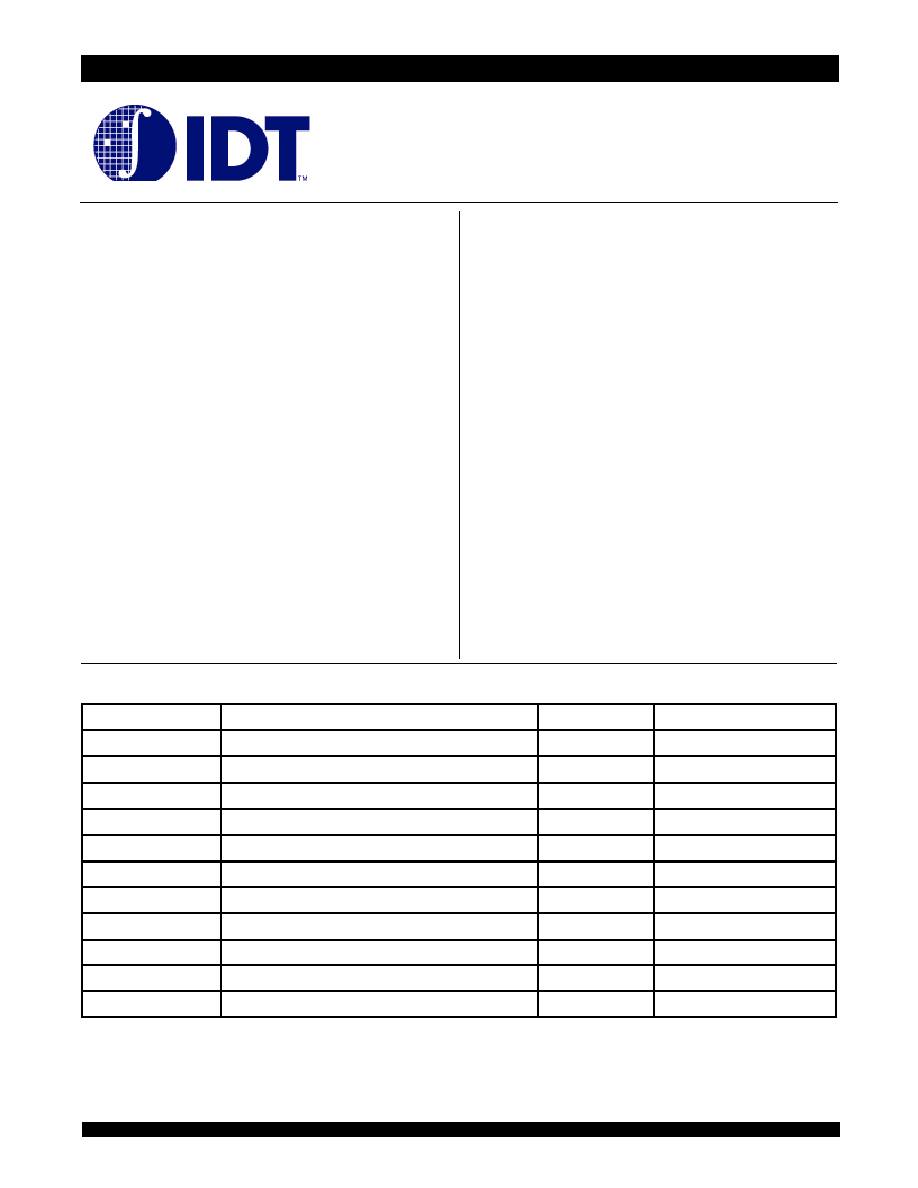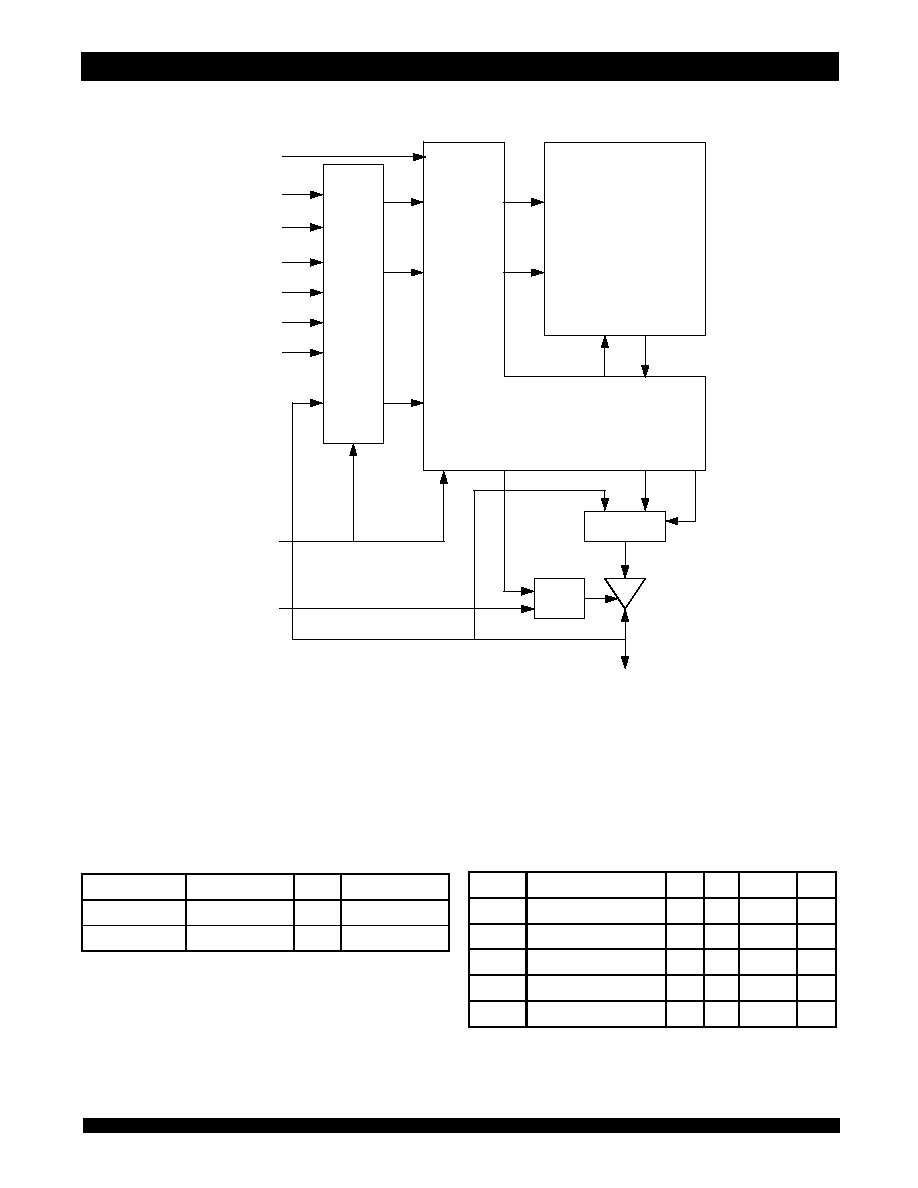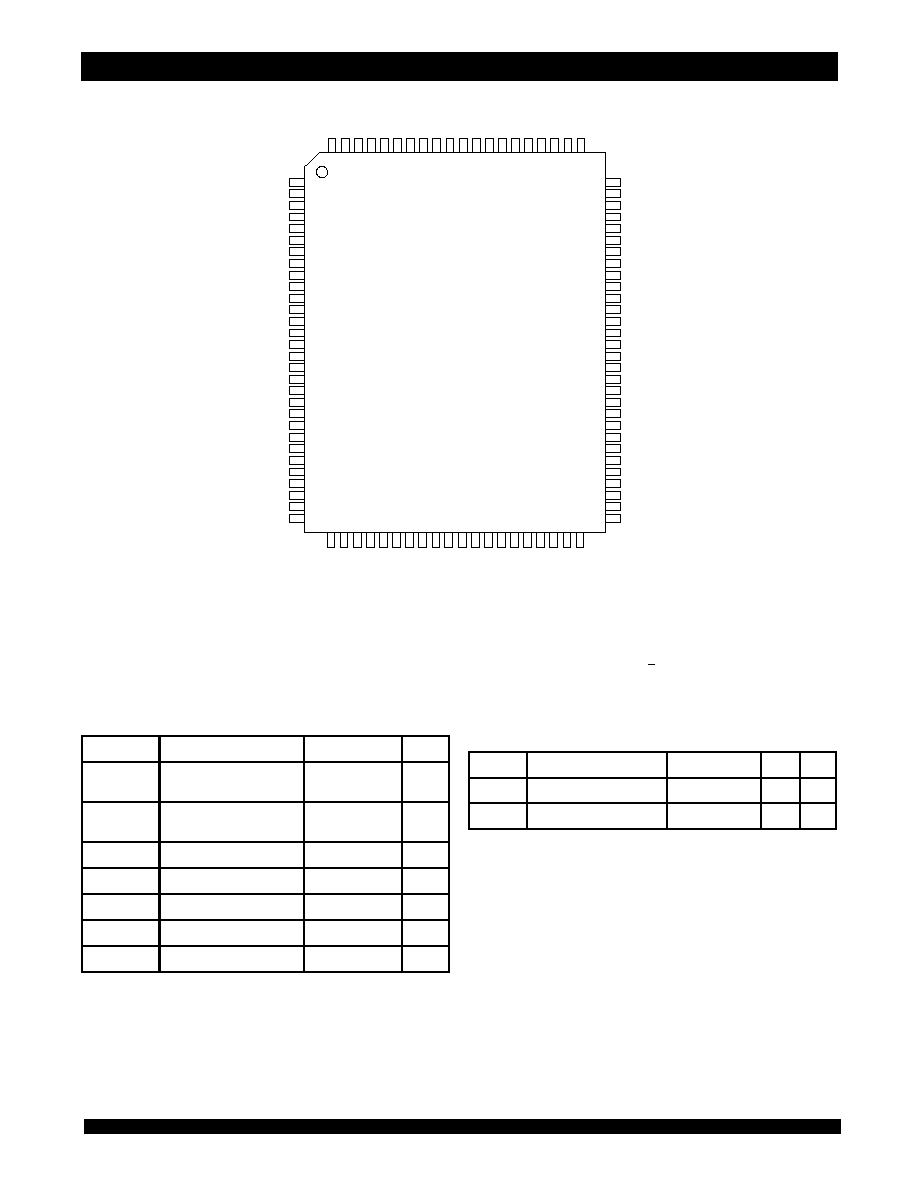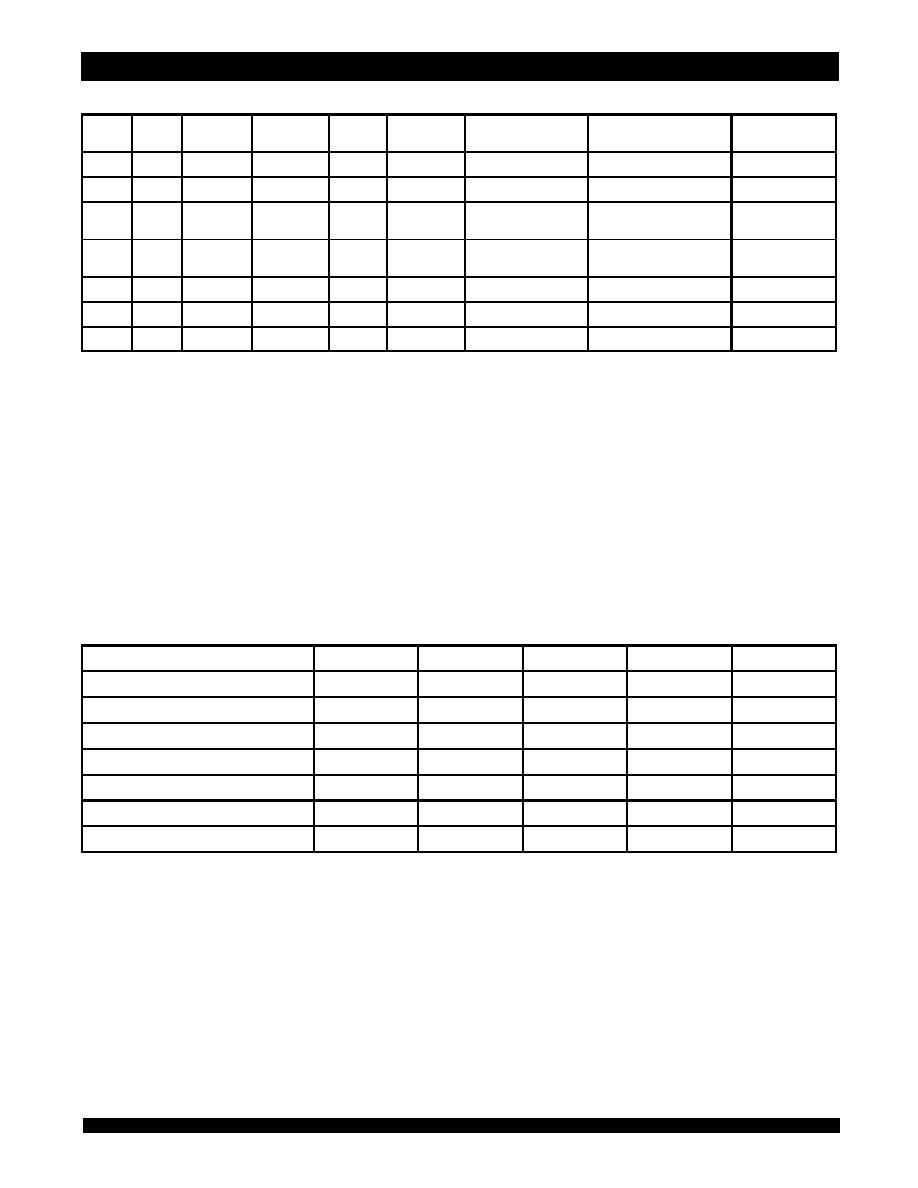
1
©1999 Integrated Device Technology, Inc.
DECEMBER 1999
DSC-3822/03
ZBT and Zero Bus Turnaround are trademarks of Integrated Device Technology, Inc. and the architecture is supported by Micron Technology and Motorola Inc.
IDT71V547
Pin Description Summary
The IDT71V547 contains address, data-in and control signal registers.
The outputs are flow-through (no output data register). Output enable is
the only asynchronous signal and can be used to disable the outputs at
any given time.
A Clock Enable (
CEN
) pin allows operation of the IDT71V547 to
be suspended as long as necessary. All synchronous inputs are
ignored when
CEN
is high and the internal device registers will hold
their previous values.
There are three chip enable pins (
CE
1
, CE
2
,
CE
2
) that allow the user
to deselect the device when desired. If any one of these three is not active
when ADV/
LD
is low, no new memory operation can be initiated and any
burst in progress is stopped. However, any pending data transfers (reads
or writes) will be completed. The data bus will tri-state one cycle after the
chip was deselected or write initiated.
The IDT71V547 has an on-chip burst counter. In the burst mode, the
IDT71V547 can provide four cycles of data for a single address presented
to the SRAM. The order of the burst sequence is defined by the
LBO
input
pin. The
LBO
pin selects between linear and interleaved burst sequence.
The ADV/
LD
signal is used to load a new external address (ADV/
LD
=
LOW) or increment the internal burst counter (ADV/
LD
= HIGH).
The IDT71V547 SRAM utilizes IDT's high-performance, high-volume
3.3V CMOS process, and is packaged in a JEDEC Standard 14mm x
20mm 100-pin thin plastic quad flatpack (TQFP) for high board density.
Features
x
x
x
x
x
128K x 36 memory configuration, flow-through outputs
x
x
x
x
x
Supports high performance system speed - 95 MHz
(8ns Clock-to-Data Access)
x
x
x
x
x
ZBT
TM
Feature - No dead cycles between write and read
cycles
x
x
x
x
x
Internally synchronized signal eliminates the need to
control
OE
OE
OE
OE
OE
x
x
x
x
x
Single R/
W
W
W
W
W
(READ/WRITE) control pin
x
x
x
x
x
4-word burst capability (Interleaved or linear)
x
x
x
x
x
Individual byte write (
BW
BW
BW
BW
BW
1
-
BW
BW
BW
BW
BW
4
) control (May tie active)
x
x
x
x
x
Three chip enables for simple depth expansion
x
x
x
x
x
Single 3.3V power supply (±5%)
x
x
x
x
x
Packaged in a JEDEC standard 100-pin TQFP package
Description
The IDT71V547 is a 3.3V high-speed 4,718,592-bit (4.5 Megabit)
synchronous SRAM organized as 128K x 36 bits. It is designed to eliminate
dead bus cycles when turning the bus around between reads and writes,
or writes and reads. Thus it has been given the name ZBT
TM
, or Zero Bus
Turn-around.
Address and control signals are applied to the SRAM during one clock
cycle, and on the next clock cycle, its associated data cycle occurs, be it
read or write.
128K X 36, 3.3V Synchronous
SRAM with ZBTTM Feature, Burst
Counter and Flow-Through Outputs
A
0
- A
16
Address Inputs
Input
Synchronous
CE
1
, CE
2
,
CE
2
Three Chip Enables
Input
Synchronous
OE
Output Enable
Input
Asynchronous
R/
W
Read/Write Signal
Input
Synchronous
CEN
Clock Enable
Input
Synchronous
BW
1
,
BW
2
,
BW
3
,
BW
4
Individual Byte Write Selects
Input
Synchronous
CLK
Clock
Input
N/A
ADV/
LD
Advance Burst Address / Load New Address
Input
Synchronous
LBO
Linear / Interleaved Burst Order
Input
Static
I/O
0
- I/O
31
, I/O
P1
-
I/O
P4
Data Input/Output
I/O
Synchronous
V
DD
3.3V Power
Supply
Static
V
SS
Ground
Supply
Static
3822 tbl 01

2
IDT71V547, 128K x 36, 3.3V Synchronous SRAM with
ZBT
TM
TM
TM
TM
TM
Feature, Burst Counter and Flow-Through Outputs Commercial and Industrial Temperature Ranges
Pin Definitions
(1)
NOTE:
1. All synchronous inputs must meet specified setup and hold times with respect to CLK.
Symbol
Pin Function
I/O
Active
Description
A
0
- A
16
Address Inputs
I
N/A
Synchronous Address inputs. The address register is triggered by a combination
of the rising edge of CLK, ADV/
LD
Low,
CEN
Low and true chip enables.
ADV/
LD
Address/Load
I
N/A
ADV/
LD
is a synchronous input that is used to load the internal registers with new
address and control when it is sampled low at the rising edge of clock with the
chip selected. When ADV/
LD
is low with the chip deselected, any burst in
progress is terminated. When ADV/
LD
is sampled high then the internal burst
counter is advanced for any burst that was in progress. The external addresses
are ignored when ADV/
LD
is sampled high.
R/
W
Read/Write
I
N/A
R/
W
signal is a synchronous input that identifies whether the current load cycle
initiated is a Read or Write access to the memory array. The data bus activity for
the current cycle takes place one clock cycle later.
CEN
Clock Enable
I
LOW
Synchronous Clock Enable Input. When
CEN
is sampled high, all other
synchronous inputs, including clock are ignored and outputs remain unchanged.
The effect of
CEN
sampled high on the device outputs is as if the low to high
clock transition did not occur. For normal operation,
CEN
must be sampled low at
rising edge of clock.
BW
1
-
BW
4
Individual Byte
Write Enables
I
LOW
Synchronous byte write enables. Enable 9-bit byte has its own active low byte
write enable. On load write cycles (When R/
W
and ADV/
LD
are sampled low) the
appropriate byte write signal (
BW
1
-
BW
4
) must be valid. The byte write signal
must also be valid on each cycle of a burst write. Byte Write signals are ignored
when R/
W
is sampled high. The appropriate byte(s) of data are written into the
device one cycle later.
BW
1
-
BW
4
can all be tied low if always doing write to the
entire 36-bit word.
CE
1
,
CE
2
Chip Enables
I
LOW
Synchronous active low chip enable.
CE
1
and
CE
2
are used with CE
2
to
enable the IDT71V547. (
CE
1
or
CE
2
sampled high or CE
2
sampled low) and
ADV/
LD
low at the rising edge of clock, initiates a deselect cycle. This device has
a one cycle deselect, i.e., the data bus will tri-state one clock cycle after deselect
is initiated.
CE2
Chip Enable
I
HIGH
Synchronout active high chip enable. CE
2
is used with
CE
1
and
CE
2
to enable
the chip. CE
2
has inverted polarity but otherwise identical to
CE
1
and
CE
2
.
CLK
Clock
I
N/A
This is the clock input to the IDT71V547. Except for
OE
, all timing references for
the device are made with respect to the rising edge of CLK.
I/O
0
- I/O
31
I/O
P1 -
I/O
P4
Data Input/Output
I/O
N/A
Data input/output (I/O) pins. The data input path is registered, triggered by the
rising edge of CLK. The data output path is flow-through (no output register).
LBO
Linear Burst
Order
I
LOW
Burst order selection input. When
LBO
is high the Interleaved burst sequence is
selected. When
LBO
is low the Linear burst sequence is selected.
LBO
is a static
DC input.
OE
Output Enable
I
LOW
Asynchronous output enable.
OE
must be low to read data from the 71V547.
When
OE
is high the I/O pins are in a high-impedance state.
OE
does not need
to be actively controlled for read and write cycles. In normal operation,
OE
can be
tied low.
V
DD
Power Supply
N/A
N/A
3.3V power supply input.
V
SS
Ground
N/A
N/A
Ground pin.
3822 tbl 02

6.42
3
IDT71V547, 128K x 36, 3.3V Synchronous SRAM with
ZBT
TM
TM
TM
TM
TM
Feature, Burst Counter and Flow-Through Outputs Commercial and Industrial Temperature Ranges
Functional Block Diagram
Recommended Operating
Temperature and Supply Voltage
Recommended DC Operating
Conditions
Clk
D
Q
D
Q
D
Q
Address A [0:16]
Control Logic
Address
Control
DI
DO
I
nput
R
eg
i
s
t
e
r
3822 drw 01
Clock
Data I/O [0:31], I/O P[1:4]
Mux
Sel
Gate
O E
C E
1
, CE2
C E
2
R/
W
C EN
ADV/
LD
BW
x
LBO
128K x 36 BIT
MEMORY ARRAY
,
NOTES:
1. V
IL
(min.) = ≠1.0V for pulse width less than t
CYC
/2, once per cycle.
2. V
IH
(max.) = +6.0V for pulse width less than t
CYC
/2, once per cycle.
Grade
Temperature
V
SS
V
DD
Commercial
0
O
C to +70
O
C
0V
3.3V± 5%
Industrial
-40
O
C to +85
O
C
0V
3.3V± 5%
3822 tbl 03
Symbol
Parameter
Min.
Typ.
Max.
Unit
V
DD
Supply Voltage
3.135
3.3
3.465
V
V
SS
Ground
0
0
0
V
V
IH
Input High Voltage - Inputs
2.0
____
4.6
V
V
IH
Input High Voltage - I/O
2.0
____
V
DD
+0.3
(2)
V
V
IL
Input Low Voltage
-0.5
(1)
____
0.8
V
3822 tbl 04

4
IDT71V547, 128K x 36, 3.3V Synchronous SRAM with
ZBT
TM
TM
TM
TM
TM
Feature, Burst Counter and Flow-Through Outputs Commercial and Industrial Temperature Ranges
Absolute Maximum Ratings
(1)
Pin Configuration
Capacitance
(T
A
= +25∞C, f = 1.0MHz, TQFP package)
NOTES:
1. Pin 14 does not have to be connected directly to V
SS
as long as the input voltage is < V
IL
.
2. Pins 83 and 84 are reserved for future A
17
(8M) and A
18
(16M) respectively.
100 99 98 97 96 95 94 93 92 91 90
87 86 85 84 83 82 81
89 88
1
2
3
4
5
6
7
8
9
10
11
12
13
14
15
16
17
18
19
20
21
22
23
24
25
26
27
28
29
30
A
6
A
7
C
E
1
C
E
2
B
W
2
B
W
1
C
E
2
V
D
D
V
S
S
C
LK
R
/
W
C
E
N
O
E
A
D
V
/
LD
N
C
(2
)
N
C
(2
)
A
8
A
9
31 32 33 34 35 36 37 38 39 40 41 42 43 44 45 46 47 48 49 50
N
C
N
C
N
C
N
C
LB
O
A
14
A
13
A
12
A
11
A
10
V
D
D
V
S
S
A
0
A
1
A
2
A
3
A
4
A
5
V
DD
V
SS
V
SS
V
DD
I/O
27
I/O
26
V
SS
V
DD
I/O
25
I/O
24
V
DD
V
SS
V
SS
V
DD
80
79
78
77
76
75
74
73
72
71
70
69
68
67
66
65
64
63
62
61
60
59
58
57
56
55
54
53
52
51
V
DD
V
SS
I/O
23
I/O
22
V
SS
V
DD
I/O
21
I/O
20
V
SS
V
DD
I/O
11
I/O
10
V
DD
V
SS
I/O
9
I/O
8
I/O
7
I/O
6
V
SS
V
DD
I/O
5
I/O
4
PK100-1
3822 drw 02
V
SS
(1)
V
DD
A
15
A
16
I/O
12
I/O
28
V
SS
V
SS
B
W
4
B
W
3
I/O
P2
I/O
14
I/O
15
I/O
13
I/O
2
I/O
3
I/O
P1
I/O
0
I/O
1
I/O
P4
I/O
30
I/O
31
I/O
29
I/O
19
I/O
18
I/O
P3
I/O
16
I/O
17
NOTES:
1. Stresses greater than those listed under ABSOLUTE MAXIMUM RATINGS may
cause permanent damage to the device. This is a stress rating only and
functional operation of the device at these or any other conditions above those
indicated in the operational sections of this specification is not implied. Exposure
to absolute maximum rating conditions for extended periods may affect
reliability.
2. V
DD
and Input terminals only.
3. I/O terminals.
NOTE:
1. This parameter is guaranteed by device characterization, but not production tested.
Symbol
Rating
Value
Unit
V
TERM
(2)
Terminal Voltage
with Respect to GND
-0.5 to +4.6
V
V
TERM
(3)
Terminal Voltage
with Respect to GND
-0.5 to V
DD
+0.5
V
T
A
Operating Temperature
0 to +70
o
C
T
BIAS
Temperature Under Bias
-55 to +125
o
C
T
STG
Storage Temperature
-55 to +125
o
C
P
T
Power Dissipation
2.0
W
I
OUT
DC Output Current
50
mA
3822 tbl 05
Symbol
Parameter
(1)
Conditions
Max.
Unit
C
IN
Input Capacitance
V
IN
= 3dV
5
pF
C
I/O
I/O Capacitance
V
OUT
= 3dV
7
pF
3822 tbl 06
Top View
TQFP

6.42
5
IDT71V547, 128K x 36, 3.3V Synchronous SRAM with
ZBT
TM
TM
TM
TM
TM
Feature, Burst Counter and Flow-Through Outputs Commercial and Industrial Temperature Ranges
Partial Truth Table for Writes
(1)
Synchronous Truth Table
(1)
NOTES:
1. L = V
IL
, H = V
IH
, X = Don't Care.
2. When ADV/
LD
signal is sampled high, the internal burst counter is incremented. The R/
W
signal is ignored when the counter is advanced. Therefore the nature
of the burst cycle (Read or Write) is determined by the status of the R/
W
signal when the first address is loaded at the beginning of the burst cycle.
3. Deselect cycle is initiated when either (
CE
1
, or
CE
2
is sampled high or CE
2
is sampled low) and ADV/
LD
is sampled low at rising edge of clock. The data bus
will tri-state one cycle after deselect is initiated.
4. When
CEN
is sampled high at the rising edge of clock, that clock edge is blocked from propogating through the part. The state of all the internal registers and the
I/Os remains unchanged.
5. To select the chip requires
CE
1
= L,
CE
2
= L and CE
2
= H on these chip enable pins. The chip is deselected if either one of thechip enable is false.
6. Device Outputs are ensured to be in High-Z during device power-up.
7. Q - data read from the device, D - data written to the device.
CEN
R/
W
Chip
(5)
Enable
ADV/
LD
BW
x
ADDRESS
USED
PREVIOUIS CYCLE
CURRENT CYCLE
I/O
(1 cycle later)
L
L
Select
L
Valid
External
X
LOAD WRITE
D
(7)
L
H
Select
L
X
External
X
LOAD READ
Q
(7)
L
X
X
H
Valid
Internal
LOAD WRITE/
BURST WRITE
BURST WRITE
(Advance Burst Counter)
(2)
D
(7)
L
X
X
H
X
Internal
LOAD READ/
BURST READ
BURST READ
(Advance Burst Counter)
(2)
Q
(7)
L
X
Deselect
L
X
X
X
DESELECT or STOP
(3)
HiZ
L
X
X
H
X
X
DESELECT / NOOP
NOOP
HiZ
H
X
X
X
X
X
X
SUSPEND
(4)
Previous Value
3822 tbl 07
NOTES:
1. L = V
IL
, H = V
IH
, X = Don't Care.
2. Multiple bytes may be selected during the same cycle.
Operation
R/
W
BW
1
BW
2
BW
3
BW
4
READ
H
X
X
X
X
WRITE ALL BYTES
L
L
L
L
L
WRITE BYTE 1 (I/O [0:7], I/O
P1
)
(2)
L
L
H
H
H
WRITE BYTE 2 (I/O [8:15], I/O
P2
)
(2)
L
H
L
H
H
WRITE BYTE 3 (I/O [16:23], I/O
P3
)
(2)
L
H
H
L
H
WRITE BYTE 4 (I/O [24:31], I/O
P4
)
(2)
L
H
H
H
L
NO WRITE
L
H
H
H
H
3822 tbl 08




